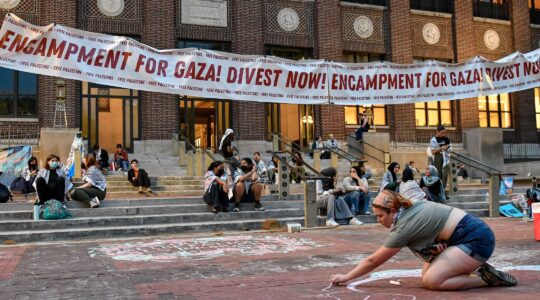Haviv Reteg Gur, in a recent Jerusalem Post Op-ed, called out the broader Jewish community over what he says is its failing to reach out to the 220,000 alumni of the free 10-day trips to Israel that Birthright Israel offers.
Gur:
A shared experience of 220,000 of the less-affiliated among Jewish youth could be the springboard for organizational involvement, educational networks, Shabbat dinners. Only in the past couple years have initial efforts in this direction begun, through Hillel, Birthright NEXT and collaboration with Masa.
But these programs don’t reach the majority of alums. Most remember their "bus friends" – in this day and age, they connected on Facebook while still on the bus. They even remember fondly the soldiers who accompanied their trip and struggled to explain to their foreigner-brethren the meaning of Israeliness. But these connections are wasted if they are not directed at new Jewish experiences back home.
The challenge birthright poses to the Jewish world is how to transform their success into something of an altogether different scale. When a quarter-million young Jews have visited Israel at the Jewish people’s expense, it is a tragic waste that their Jewish communities make little effort to continue their engagement.
Ten years, 260,000 Israeli and Diaspora participants, countless friendships, Jewish conversations and academic studies – and the question remains: Where’s the follow-up?
BIrthright NEXT’s executive director, Rabbi Daniel Brenner, responded in a post on ejewishphilanthropy, saying there’s plenty of follow-up, but it has a visibility problem:
In 2009, the total number of Taglit-Birthright Israel North American trip participants for 2009 was just shy of 19,000. In the last few months, we have worked with volunteer leaders from those buses to host over 12,200 young adults for home-hospitality Shabbat meals in North America. 93% of our NEXT Shabbat meals involved some or all of the core ritual elements of Shabbat. More importantly, we found that nearly every volunteer felt that this was a positive Jewish communal experience and wanted to host again and get more involved in their local community. By the end of 2010, volunteers from this group of 19,000 trip participants will have hosted over 30,000 young adults for a NEXT Shabbat event.
This particular program is one of four areas of focus for Birthright Israel NEXT that begin on the trip and flow naturally into involvement post-trip (the others being Hebrew language learning, deepening the Israel connection and encouraging community involvement). In addition to the Shabbat program, Birthright Israel NEXT runs ulpanim for young adults in ten North American cities, works with the Ministry of Foreign Affairs through local consulates in select cities to deepen ties to Israel, and has involved thousands of post-college young Jewish adults by partnering with local Jewish and Israel-focused organizations (we linked up with thirty-two such organizations in the last year). It is through these four areas (and through many partners) that we are on track to involve 100,000 young Jewish adults in our programming in 2010.
These figures do not count the “ramping up” of programs from our on campus partner Hillel and from our colleagues at MASA, two organizations who have certainly devoted significant energy to “Birthright follow-up” in the last two years. Nor do they include the work of forward-thinking Federations, like the CJP in Boston, that have adopted new models on campus that are delivering follow-up success.

Help ensure Jewish news remains accessible to all. Your donation to the Jewish Telegraphic Agency powers the trusted journalism that has connected Jewish communities worldwide for more than 100 years. With your help, JTA can continue to deliver vital news and insights. Donate today.





